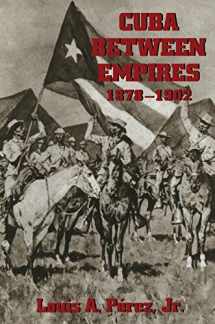
Cuba Between Empires 1878-1902 (Pitt Latin American Series)
ISBN-13:
9780822956877
ISBN-10:
082295687X
Edition:
1
Author:
Louis A. Jr. Perez
Publication date:
1998
Publisher:
University of Pittsburgh Press
Format:
Paperback
512 pages
Category:
Caribbean & West Indies
,
Americas History
FREE US shipping
Book details
ISBN-13:
9780822956877
ISBN-10:
082295687X
Edition:
1
Author:
Louis A. Jr. Perez
Publication date:
1998
Publisher:
University of Pittsburgh Press
Format:
Paperback
512 pages
Category:
Caribbean & West Indies
,
Americas History
Summary
Cuba Between Empires 1878-1902 (Pitt Latin American Series) (ISBN-13: 9780822956877 and ISBN-10: 082295687X), written by authors
Louis A. Jr. Perez, was published by University of Pittsburgh Press in 1998.
With an overall rating of 3.6 stars, it's a notable title among other
Caribbean & West Indies
(Americas History) books. You can easily purchase or rent Cuba Between Empires 1878-1902 (Pitt Latin American Series) (Paperback) from BooksRun,
along with many other new and used
Caribbean & West Indies
books
and textbooks.
And, if you're looking to sell your copy, our current buyback offer is $0.3.
Description
Cuban independence arrived formally on May 20, 1902, with the raising of the Cuban flag in Havana - a properly orchestrated and orderly inauguration of the new republic. But something had gone awry. Republican reality fell far short of the separatist ideal. In an unusually powerful book that will appeal to the general reader as well as to the specialist, Louis A. Perez, Jr., recounts the story of the critical years when Cuba won its independence from Spain only to fall in the American orbit.The last quarter of the nineteenth century found Cuba enmeshed in a complicated colonial environment, tied to the declining Spanish empire yet economically dependent on the newly ascendant United States. Rebellion against Spain had involved two generations of Cubans in major but fruitless wars. By careful examination of the social and economic changes occurring in Cuba, and of the political content of the separatist movement, the author argues that the successful insurrection of 1895-98 was not simply the last of the New World rebellions against European colonialism. It was the first of a genre that would become increasingly familiar in the twentieth century: a guerrilla war of national liberation aspiring to the transformation of society.The third player in the drama was the United States. For almost a century, the United States had pursuedthe acquistion of Cuba. Stepping in when Spain was defeated, the Americans occupied Cuba ostensibly to prepare it for independence but instead deliberately created institutions that restored the social hierarchy and guaranteed political and economic dependence. It was not the last time the U.S. intervention would thwart the Cuban revolutionary impulse.


We would LOVE it if you could help us and other readers by reviewing the book
Book review

Congratulations! We have received your book review.
{user}
{createdAt}
by {truncated_author}


